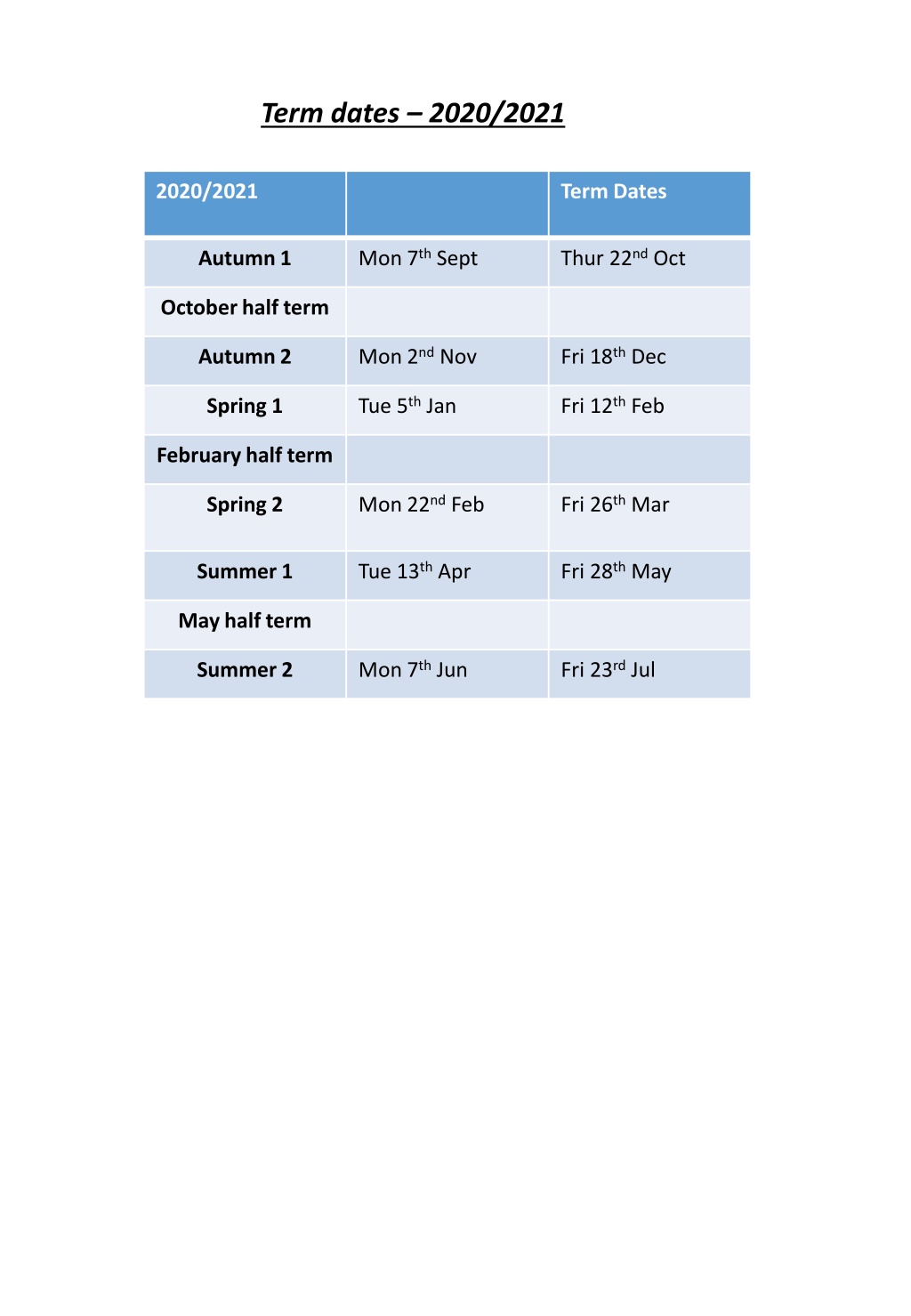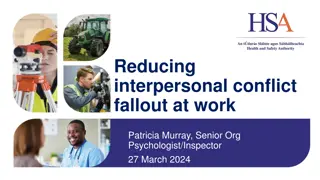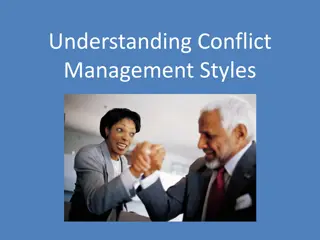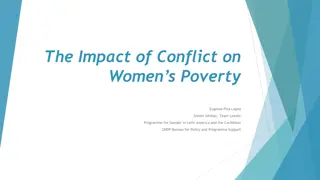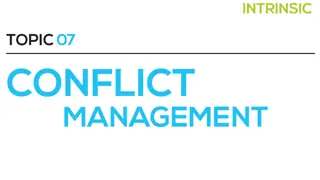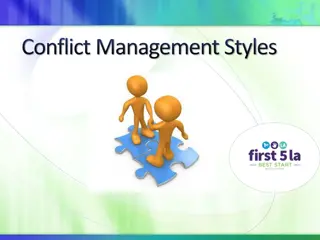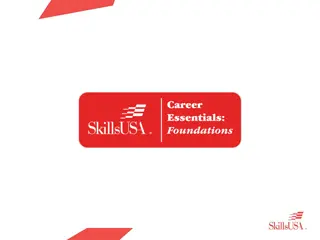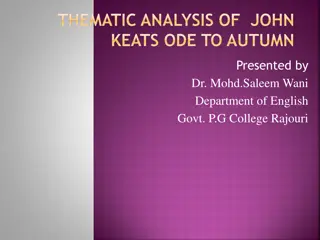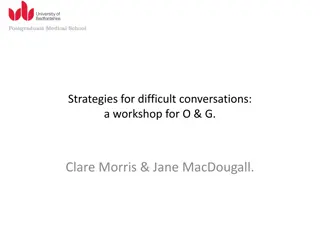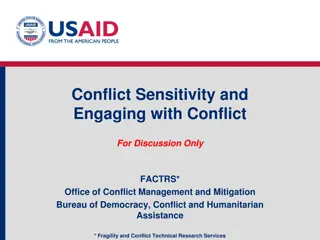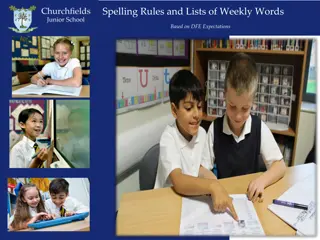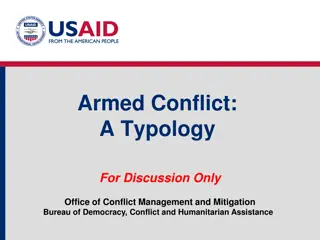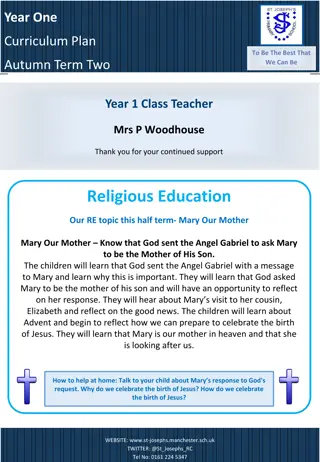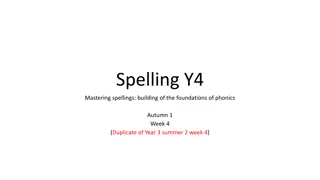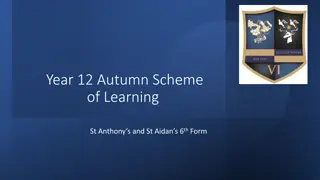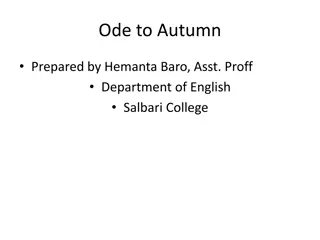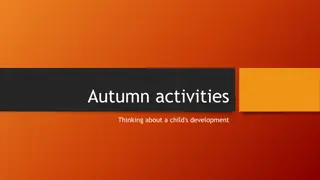Year 9 Autumn Conflict Unit Overview
This unit for Year 9 students aims to introduce them to literature surrounding conflict through central texts like "Noughts and Crosses" playscript, war poetry, and political speeches. Students will analyze language and structural devices, develop their understanding of different forms of writing, and produce their own speeches and analytical writing. The unit covers topics like various types of conflict, poetic forms, rhetorical devices, and more, with a focus on oracy skills and deep analysis. Through challenging lessons and support as needed, students will enhance their reading, writing, and speaking abilities.
Uploaded on Oct 06, 2024 | 0 Views
Download Presentation

Please find below an Image/Link to download the presentation.
The content on the website is provided AS IS for your information and personal use only. It may not be sold, licensed, or shared on other websites without obtaining consent from the author. Download presentation by click this link. If you encounter any issues during the download, it is possible that the publisher has removed the file from their server.
E N D
Presentation Transcript
Term dates 2020/2021 2020/2021 Term Dates Mon 7thSept Thur 22ndOct Autumn1 Octoberhalf term Mon 2ndNov Fri 18thDec Autumn 2 Tue 5thJan Fri 12thFeb Spring 1 February half term Mon 22ndFeb Fri 26thMar Spring 2 Tue 13thApr Fri 28thMay Summer 1 May half term Mon 7thJun Fri 23rdJul Summer 2
Year 9 Autumn Conflict Unit Overview: This unit aims to introduce students to a range of Literature surrounding Conflict of all kinds. The central texts are Noughts and Crosses playscript, War poetry and Political speeches from activists. Students will explore and analyse a range of language and structural devices and develop an understanding of a range of forms of writing. They will produce and deliver their own speech and be able to compare two poems in their analytical writing. Texts and resources: Noughts and Crosses playscript War poetry: Owen, Sassoon, female perspective, modern wars They Pumped the Chest Non Fiction speeches: Mandela, Martin Luther King, Malala, Greta T, Martin Rashford letter to The Times around FSM Assessment: Oracy Assessed individual speech posed Big Question to discuss and produce response Knowledge Test Terms and definitions from study, writing work and NF study; questions from texts and context to gauge understanding of key concept Non-Fiction Writing Writing a speech in response to question and material 3 paragraphs, marked out of 20 Analytical Writing Exploring 2 poems and making comparisons 3 paragraphs, marked out of 20 Knowledge: Understanding of Conflict and different types of conflict faced by people in society and around the world Understanding of varying poetic forms and use of language to create tone/mood Exploring character through playscript and text choices Analysing language and structure in more detail and being able to draw comparisons Non Fiction rhetoric and using language to appeal to audience for particular purpose/message Using rhetoric for effect in own writing and applying Oracy skills to deliver with impact Teaching and Learning elements: Lessons should all have an element of Oracy within them: Talking Points starter, group discussion, paired opinions, team exercises, etc. The unit should enable students to analyse poems and explore deeper meanings/message Students should all read aloud to some extent to build their confidence. Challenging lessons and scaffolded support where necessary. HOT questions. Comparisons to modern events and personal experiences of conflict Vocabulary: Students should learn spellings and definitions: Critic Neutral Semi colon Ellipsis Complex sentence Declarative Imperative Sonnet Rhyming couplet Pathetic fallacy Onomatopoeia Conflict Form Structure Language Playscript Rhetoric Persuasive devices Sensationalised Home Learning / Independent reading / Enrichment: Wider reading and research conflict around the world Read additional Literature and Non Fiction Museum/library visit
Year 9 Autumn Conflict Suggested Weekly Outline (Split classes should liaise closely with the main teacher covering the key text and the other teacher running the Project lessons and Supporting main content) Week commencing Outline of content 07/09/2020 Introduction: targets, retrieval, settling, strengths/weaknesses 17/09/2020 Lecture introduction. Context of conflict. 21/09/2020 Poetry - First World War. 28/09/2020 Poetry - Owen and Sassoon 05/10/2020 Analysis of poems. 12/10/2020 Speed Read Noughts and Crosses - explore play format 19/10/2020 Speed Read Noughts and Crosses - look at character HALF TERM 02/11/2020 Poetry - modern conflict. Discuss comparisons 09/11/2020 Poetry - female perspective 16/11/2020 Non Fiction study - MLK. Rhetoric 23/11/2020 Non Fiction study - Mandela 30/11/2020 Knowledge test. Writing speech 07/12/2020 Oracy - delivery of speeches 14/12/2020 Green pen and drawing together learning from unit
Year 9 Spring Identity & Voice Unit Overview: This unit aims to enable students to question and hear a range of voices within Literature, from all areas of society and culture. Central text to include A Doll s House/1984/To Kill a Mockingbird/Yellow Wallpaper, students will study in depth and also explore a range of Identity poets. They will complete their own writing pieces with a Dystopian element to them. Students will focus on perspective and language use throughout this unit and develop a sophisticated style of analysis. Texts and resources: 1984/A Doll s House/ To Kill a Mockingbird/The Yellow Wallpaper Poetry from Agard, Zephaniah, Mary Casey, Alvi, Binter Breeze Dystopia Writing Unit 6 textbook Assessment: Oracy Assessed Group debate posed Big Question to discuss and answer Knowledge Test Terms and definitions from study, writing work and poetry; questions from texts and context to gauge understanding of key concept Narrative Writing Writing own short story 3 paragraphs, marked out of 20 Analytical Writing Exploring text and choices made 3 paragraphs, marked out of 20 Knowledge: Understanding of Identity and Voice and how people are treated differently at times Explaining understanding of a text and how writer choices can have an impact on the reader seeing things from a certain perspective Exploring themes within a text Discussing and articulating the impact on a reader Being able to evaluate a text and discuss how effective a text is Applying knowledge to create own piece of writing, thinking carefully about narrative voice and structures, as well as attitudes and theme Vocabulary: Students should learn spellings and definitions: Theme Structural features Marginalised Persona Narrator Motif Dialect Accent Colloquialisms Teaching and Learning elements: Lessons should all have an element of Oracy within them: Talking Points starter, image stimulus, group discussion, paired opinions, team exercises, etc. The unit should enable students to analyse and evaluate a text Students should all read aloud to some extent to build their confidence. Challenging lessons and scaffolded support where necessary. HOT questions. Discussion around their identity and how they can use their voice Identity Voice Narrative Perspective Dystopia Debate Language Evaluation Home Learning / Independent reading / Enrichment: Theatre visit where possible Showcase of their writing work and ideas Creating Identity cards and investigations Research around famous voices and messages
Year 9 Spring Identity & Voice Suggested Weekly Outline (Split classes should liaise closely with the main teacher covering the key text and the other teacher running the Project lessons and Supporting main content) Week commencing Outline of content 04/01/2021 Introduction: targets, green pen, retrieval, strengths/weaknesses 11/01/2021 Lecture introduction. Identity and Voice. Speed Read Yellow Wallpaper 18/01/2021 Speed Read - The Yellow Wallpaper. Oracy discussion 25/01/2021 Analytical writing - character and voice. 01/02/2021 Poetry - Agard and Zephaniah 08/02/2021 Poetry - Casey and Alvi HALF TERM 22/02/2021 Poetry - Breeze 01/03/2021 Knowledge test 08/03/2021 Writing textbook Dystopia 15/03/2021 Writing work 22/03/2021 Own narrative writing
Year 9 Summer Ambition & Desire Unit Overview: This unit aims to enable students to really immerse themselves in their first Literature texts Shakespeare s Macbeth. Students will revisit prior contextual knowledge and build on it to fully understand the play. They will read it closely and analyse language and structure to explore character and theme. They will complete a piece of Non Fiction writing and deliver it via their EPQ style project work and embed their analytical sophistication. Texts and resources: Shakespeare s Macbeth Non Fiction articles and reports around supernatural, witch trials, monarchy Theatre/film adaptations Assessment: Oracy Assessed individual presentation posed Big Question to discuss and support their opinions with research as part of their academic project Knowledge Test Terms and definitions from study, writing work and NF study; questions from texts and context to gauge understanding of key concepts and ideas across Year 9 Non-Fiction Writing Writing an article/report 3 paragraphs, marked out of 20 Analytical Writing Exploring extract and choices made 3 paragraphs, marked out of 20 GCSE style exam to assess knowledge and understanding of play Knowledge: Understanding of Shakespeare play and characters Knowledge of how to analyse a text in detail, using the contextual knowledge to support these ideas Exploring the impact of language and structural choices Exploring context in depth and understanding the play s message and themes Picking out key features used by Shakespeare and understanding the impact they have on the audience and would have had historically Vocabulary: Students should learn spellings and definitions: Suspense Patriarchy Foreshadowing Repetition Hyperbole Iambic pentameter Caesura Blank verse Supernatural Manipulation Teaching and Learning elements: Lessons should all have an element of Oracy within them: Talking Points starter, group discussion, paired opinions, team exercises, etc. The unit should enable students to perform Shakespeare text, as though in a play. Students should all read aloud to some extent to build their confidence. Challenging lessons and scaffolded support where necessary. HOT questions. Ambition Desire Power Hero Villain Soliloquy Dramatic irony Tension Home Learning / Independent reading / Enrichment: Wider reading and research read around subject Theatre visit Character profiles and create own revision book Exploring supernatural elements
Year 9 Summer Ambition & Desire Suggested Weekly Outline (Split classes should liaise closely with the main teacher covering the key text and the other teacher running the Project lessons and Supporting main content) Week commencing Outline of content 12/04/2021 Introduction: targets, green pen, retrieval, strengths/weaknesses 19/04/2021 Lecture introduction. GCSE Literature and Macbeth 26/04/2021 Speed read Macbeth 03/05/2021 Speed read Macbeth 10/05/2021 Macbeth and Lady Macbeth - character 17/05/2021 Speed read Macbeth 24/05/2021 Analytical writing. Exploring language use. 31/05/2021 HALF TERM 07/06/2021 Language analysis - key extracts 14/06/2021 Analysis of key extracts 21/06/2021 Thematic work across play 28/06/2021 Non Fiction writing article for EPQ 05/07/2021 Knowledge test and Mock exam 12/07/2021 Refining and consolidating 19/07/2021 Oracy EPQ presentation
